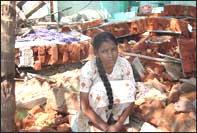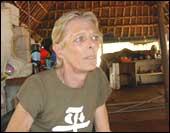The first wave of the tsunami hit the Pondichery and Tamil Nadu coast at 8 am on December 26. Seven thousand people died on the spot.
By 9.30 am, a team from Auroville, the international township inspired by the Mother and Sri Aurobindo, and which is situated near Pondichery, swung into action. A first emergency meeting was called in the house of two Auroville residents and it was immediately decided to set up a camp for the people affected by the tidal waves.
By 12 pm, eight tents and seven shamianas were erected on a field near one of the Auroville communities. Two portable 5,000 litres tanks, two generators, a field kitchen with four cooking ranges, monitored by eight ladies and four cooks, were put into service. Three of Auroville's load carriers, two tractors and two buses to pick up refugees were also commissioned.
The camp was manned by more than 60 Tamil youth from the villages within Auroville as well as many Aurovillians from all parts of the world.
By 2 pm, 750 people were fed and 350 food packets distributed. All throughout the afternoon, refugees kept streaming in. Another 1,200 people were fed in the evening. Blankets were arranged as the night was cold and windy.
On the second day, everyone was moved to the Kuilapalayam Trust School, which is run by Auroville, as there was a threat of rain. The refugees were spread out in eight buildings as well as two tents. Food was cooked this time for 1,400 people; another 500 food packets were prepared for distribution. Clothes and blankets were handed out.
The extent of the disaster was becoming clear by then. A quick survey was conducted amongst the villages and the Auroville communities that dot the beach. In Ganagashetikkam, a village of fishermen at the extreme limit of Pondicherry, the Auroville team was met by extreme desolation: the mud houses on the beach front had been destroyed or washed away. Broken furniture lay besides the road, television sets beyond repair were put into the sun to dry, pieces of thatched roof blocked the road, power lines had fallen down, the steps leading to an old temple had collapsed.
 Three days after the catastrophe, women were wailing in sheer desolation. On the beach, the team met Ranjani (left). That fateful morning, her parents had gone to the market to sell the fish they had caught earlier that morning and she was left alone with her three-year-old little sister, Anasuya. She was cooking the morning's meal, when suddenly her sister clung onto her. Ranjani looked up and saw a huge wave advancing towards the house.
Three days after the catastrophe, women were wailing in sheer desolation. On the beach, the team met Ranjani (left). That fateful morning, her parents had gone to the market to sell the fish they had caught earlier that morning and she was left alone with her three-year-old little sister, Anasuya. She was cooking the morning's meal, when suddenly her sister clung onto her. Ranjani looked up and saw a huge wave advancing towards the house.
"I climbed onto a stool. As the water reached my shoulders, I clung onto a rafter from the roof with one hand while holding my screaming sister with the other," she sobbed. "After a few minutes my hands went numb and suddenly I saw that my sister had disappeared."
Ranjani cried and cried for help, but nobody came. Anasuya was found a few hours later, a kilometre upstream in the flooded village, dead. Tweenty-six other people, mostly children and the elderly, lost their lives. Seventy-five houses were destroyed and 265 families affected one way or the other by the tsunami which hit Ganagashetikkam.
 Next to Ganagashetikkam, one finds Eternity, an Auroville beach community. There lives a wonderful family: Yuval, the father, is an Israeli, his wife Hannah (right) is from Holland. They have five children, all raised in Auroville, each of them speaking several languages. Twenty years ago, Yuval and his family settled down on a piece of barren land on the beach where nothing grew. With hard work and dedication, they turned it into a green forest, a place of beauty and peace. They also painstakingly built houses in the community, mostly using local material: mud walls, palmyra leaves, thatch roofs, with one solitary concrete house.
Next to Ganagashetikkam, one finds Eternity, an Auroville beach community. There lives a wonderful family: Yuval, the father, is an Israeli, his wife Hannah (right) is from Holland. They have five children, all raised in Auroville, each of them speaking several languages. Twenty years ago, Yuval and his family settled down on a piece of barren land on the beach where nothing grew. With hard work and dedication, they turned it into a green forest, a place of beauty and peace. They also painstakingly built houses in the community, mostly using local material: mud walls, palmyra leaves, thatch roofs, with one solitary concrete house.
On the morning of the 26th, Hannah had one of her daughters, Jitta, with her. Jitta has two children: a daughter of two and a son who is barely eight months old. As usual in Auroville, where everybody sleeps early, everyone woke at 6 am for early morning tea in the community kitchen. At 6.30 am, Yuval felt the earth shake and asked his wife in jest, "if she was dancing on the bed." At 8.15 am, Jitta decided to put her son back to sleep on the ground floor of a house which was 200 metres away.
Everything looked so peaceful and no different from a thousand other mornings in the Eternity beach community. Suddenly Hannah heard a noise that sounded like the rushing of water. She went outside. "I saw this huge wave rushing toward me and it immediately flashed in my mind: 'Tidal Wave'." She grabbed her granddaughter, climbed to the first floor and asked her daughter to rush and get her son.
Jitta ran, with the water already swirling around her, got her baby just as he was being swept away, shouted at two guests who were sleeping in another hut -- who would have otherwise died -- and seeing that there was no way to go back to where her mother was, ran towards higher ground on the opposite side of Eternity beach.






 © 2025
© 2025